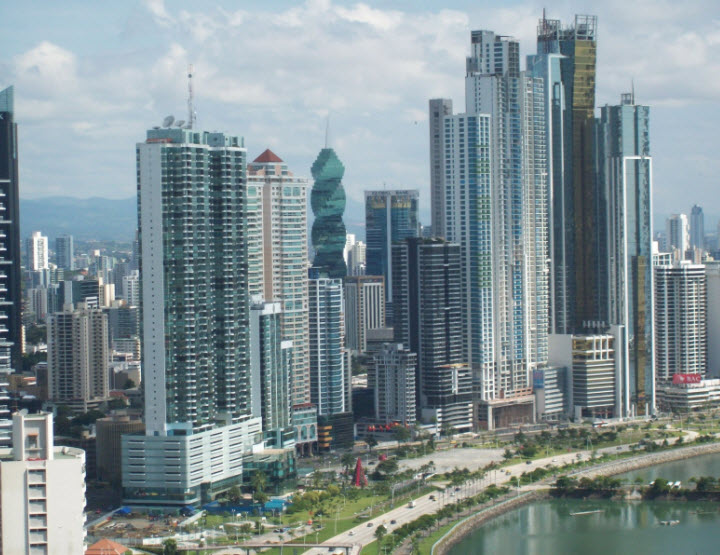On Avenida Balboa, Panama City’s premier seafront avenue, the 50 story tower blocks form a near continuous wall of glass to the Pacific Ocean. At night, however, most of the luxury apartments remain in darkness and the basement casinos are eerily deserted.
Panamanian real estate was a favourite investment of the boliburgues, Venezuelans who grew rich on the back of their political connections to the late president Hugo Chávez and his successor Nicolás Maduro.
But in the wake of the Panama Papers scandal it has become increasingly hard to launder money through the country, cutting off a potential exit route for those looking to cut loose from Maduro’s embattled regime.
“The Panamanian real estate boom began in 2005 – the Colombians came first, then the Venezuelans,” says Ernesto Gonzalez, an investment advisor for Dproperty, a local property broker. “They would sometimes buy up seven or eight luxury apartments in the same building and leave them vacant but the market has slowed dramatically in recent years, especially after the Panama Papers.”
The April 2016 publication of 11 million documents taken from Panamanian law firm Mossack Fonseca shed light on the mechanisms by which Chavistas built their wealth.
As part of the Panama Papers investigation Venezuelan journalists Ewald Scharfenburg and Alfredo Meza sifted through hundreds of thousands of documents relating to more than 700 of their compatriots.
“Chávez, with good reason, was suspicious of the country’s traditional business elite, so he created a new one,” says Scharfenburg. “Through its government connections the new elite amassed huge fortunes, both by over-billing state entities and through preferential access to dollars, which became a huge opportunity for self-enrichment.”
In 2003 Chávez pegged the bolivar, the national currency, to the US dollar. As the bolivar devalued in real terms, huge arbitrage options opened up for individuals and companies who could buy dollars at the official rate and sell them on the black market, often at over 100 times their purchase value.
With a dollarized economy, visa-free travel and a financial sector with a habit of turning a blind eye, Panama – along with Miami, Spain and Nicaragua – became a favourite destination for offshore investment and, for a while, the boligburgues could lead their often ostentatious retirements undisturbed.

Juan Guaidó – the opposition leader leader now recognized as Venezuela’s legitimate leader by dozens of western governments – has offered amnesty to Venezuelan soldiers who defect. US security adviseer John Bolton has suggested that Maduro and his inner circle should take “a long, quiet retirement … on a nice beach somewhere far from Venezuela.”
But the boliburgues can be forgiven for not taking Bolton at his word. Senior Panamanian sources told The Guardian that since early 2017 the US’s Financial Crimes Enforcement Network (FinCEN) had been working with the Lima Group of 12 Latin American countries and Canada to identify illegal offshore assets belonging to members of the Maduro regime.
In November Miami courts ruled that Alejandro Andrade, Chavez’s private secretary turned head of treasury, had accepted $1bn in bribes for providing access to preferential currency rates as part of a money laundering scam. He received a 10-year sentence and his Florida mansion, collection of classic cars and 17 racehorses are to be auctioned by the US treasury.
“The Andrade case was an inflection point,” says Scharfenburg. “It was assumed he had done a deal with US authorities to escape prosecution. Since 2016, the US’s approach has changed, the boliburgues know they are under vigilance and they are increasingly trying to move their cash to places like Turkey and the UAE.”
In October federal courts also gave a 10-year sentence to Matthias Krull, a Panama-based banker who allegedly managed accounts for 500 Venezuelan clients, for his role in a scheme to wash funds from the Venezuelan national oil company through the exchange rate system. Providing evidence as part of his plea deal, Krull implicated Raul Gorrín, the man responsible for turning opposition media network Globovisión into pro-Maduro outlet and three sons-in-law of the president. US prosecutors unsealed an indictment against Gorrín for money-laundering and bribery in November.

In a separate case uncovered by the Panama Papers investigation, Spanish authorities arrested Claudia Patricia Díaz Guillén and her husband Adrían Velásquez. He had been employed as Chavez’s bodyguard while she had been his personal nurse before replacing Andrade as head of treasury in 2011. The pair are accused of pocketing over $4bn through an exotic blend of Seychelles listed shell companies and Andorran banks. Diaz Guillén and Velásquez claim the case against them is politically motivated.
In Panama, authorities are cooperating with FinCEN and working hard to clean up a reputation left tarnished by the Panama Papers. On 6 February the country introduced tougher penalties for tax evasion.
“The environment has changed significantly,” says Dulcidio de la Guardia, Minister of Finance from 2014 to July 2018. “Panama has worked hard to introduce a world class anti-money laundering framework and it is far harder for both local and foreigners to open bank accounts.”
Since 2016 Panama’s banks have ceased to open accounts to individuals with companies listed in Venezuela due to concerns about exposure to possible corruption.
As authorities in the US, Panama and Spain home in on the Chavistas’ errant billions, those close to the regime are running out of time to secure their foreign assets. In any future rebuilding of the Venezuelan economy a strong emphasis is likely to be put on recovering stolen assets according to Pedro Armada, a Panama City based investigator and forensic accountant.
“As Venezuela enters ‘end-game’ we are likely to see an acceleration in the rate at which ill-gotten funds are expatriated,” says Armada. “The noose is tightening on the boliburgues.”
